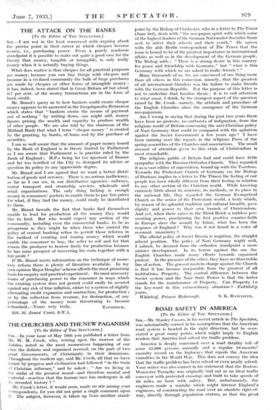THE CHURCHES AND THE NEW PAGANISM
[To the Editor of THE SPECTATOR.]
Si,—In your issue of May 10th you published a letter from Mr. W. M. Crook, who, writing upon the morrow of the Jubilee, noted as the most momentous happening of our time the definite and organized reversal, on the part of two great Governments, of ' Christianity in their dominions. Throughout the modem age, said Mr. Crook, all that we have meant by progress and civilization had followed "in the train of Christian influence," and he asked : "Are we living in the midst of the greatest moral—and therefore mental and material—reaction that the human race has undergone in all its recorded history ? "
Mr. Crook's letter, it would seem, made no stir among your correspondents, for you did not print a single comment upon it. The subject, however, is taken up from another stand- point by the Bishop of Chichester, who in a letter to The Times (June 3rd), deals with "the neo-pagan spirit with which some
of the highest leaders of the German Nationalist-Socialist State
seek to infect their. schools and their youth." He agrees with the able Berlin correspondent of The Times that the
issue is bound to be of the greatest importance in international affairs as well as in the development of the German people. The Bishop adds : "There is a strong desire in this country for peace and friendship with Germany," but "what is this Germany with which we are asked to make friends ? "
Many thousands of us, Sir, are convinced of one thing more than all others in this connexion, namely, that the greatest
of all international blunders was the failure to make friends with the German Republic. Put the purpose of this letter is not to underline that familiar thesis : it is to call attention to what must, I think, be the strangest aspect of the question raised by Mr. Crook—namely, the attitude and procedure of the English Churches since the emergence of the German neo-paganism.
Am I wrong in saying that during the past two years there have been no protests, no outbursts of indignation, from the religious world of Britain concerning the anti-Christian policy of Nazi Germany that could be compared with the agitation against the Soviet Government a few years ago ? I have been running over the reports in the religious Press of the spring assemblies of the Churches and associations. The small amount of attention given to this crisis of Christendom is most remarkable.
The religious public of Britain had and could have little sympathy with the Russian Orthodox Church. They regarded it as a vast edifice of superstition, bound up with the Tsardom. Towards the Protestant Church of Germany (as the Bishop of Durham implies in a letter to The Times) the feeling of our people has been wholly different from their feeling in ielation to any other section of the Christian world. While knowing curiously little about its ministry, its methods, or its place in the national life, they regarded the German Evangelical Church as the senior of the Protestant world, a body which, by reason of its splendid tradition and cultural breadth, gave dignity and power to their own branch of Christendom. And yet, when there arises in the Third Reich a ruthless per- secuting power, proclaiming the first positive counter-faith in Europe since the assault by Islam, what has been the response of England ? Why was it not heard in a voice of resonant unanimity ?
The official policy of Soviet Russia is negation, the straight atheist position. The Policy of Nazi Germany might well, I submit, be deemed from the orthodox standpoint a more sinister development. In its horror against the one the English Churches made many efforts towards organized protest. In the presence of the other, they have no discernible line of action. The gravest modern charge against the Church is that it has become inseparable from the greatest of all institutions, Property. The central difference between the Soviet system and the Nazi State Power is that the latter stands for the maintenance of Property. Can Property te the key-word in this extraordinary situation ?—Faithfully yours,
Whiteleaf, Princes Risborough. S. K. RATCLIFFE.










































 Previous page
Previous page